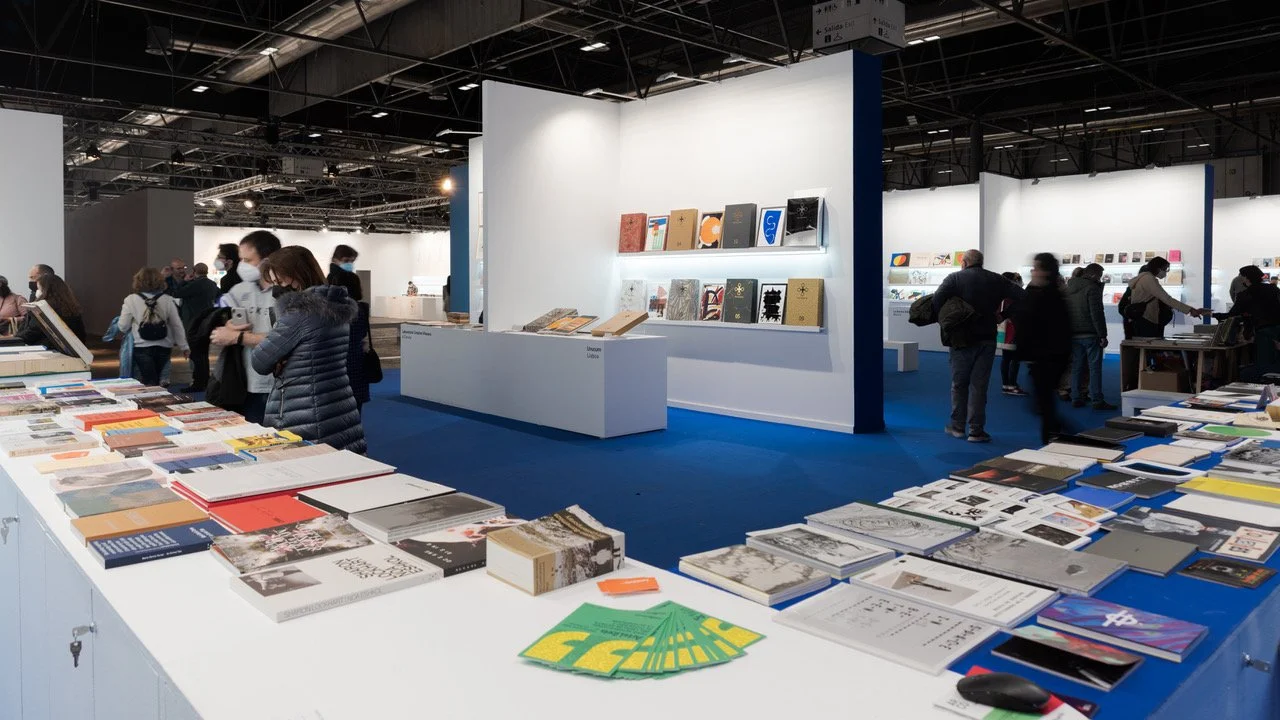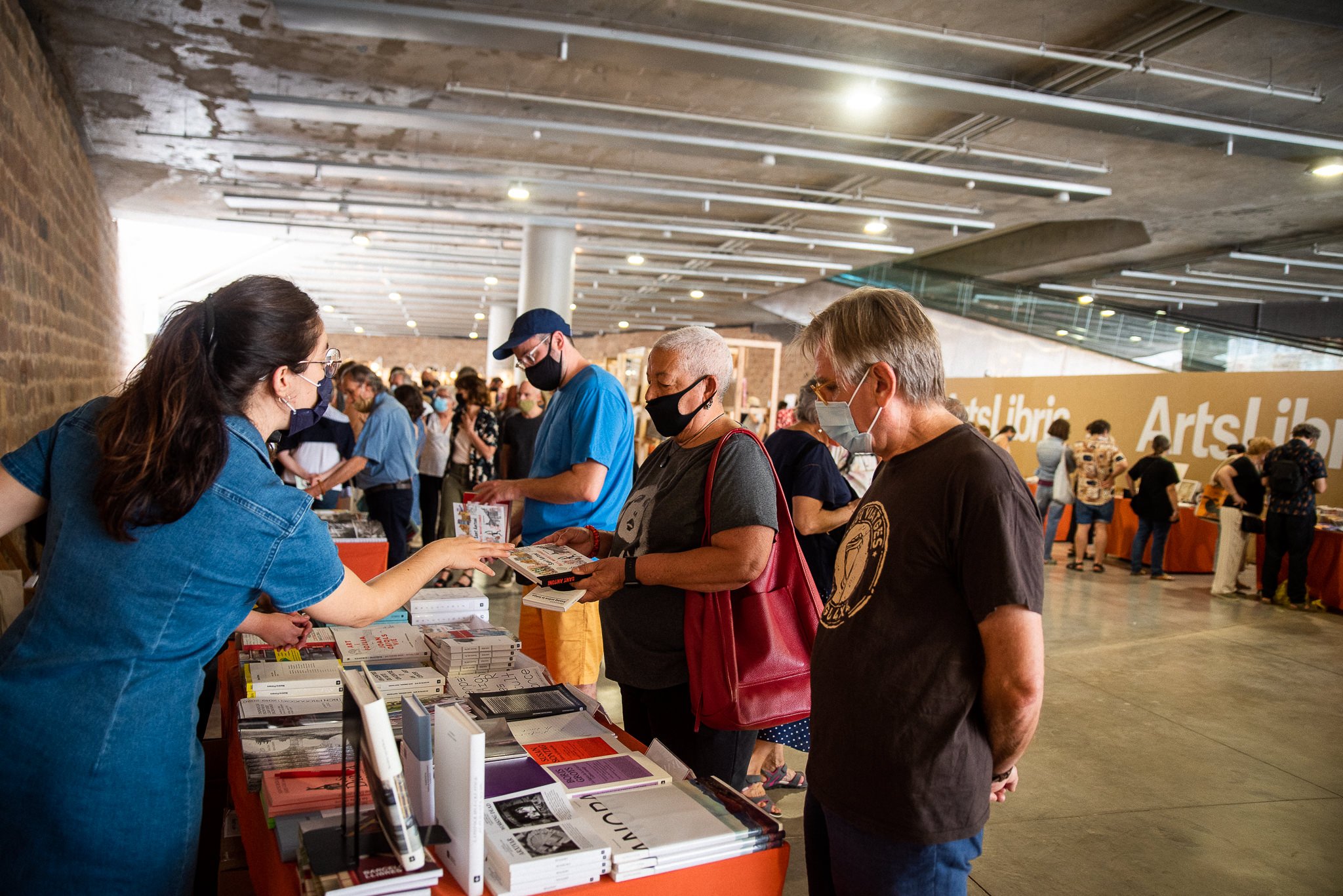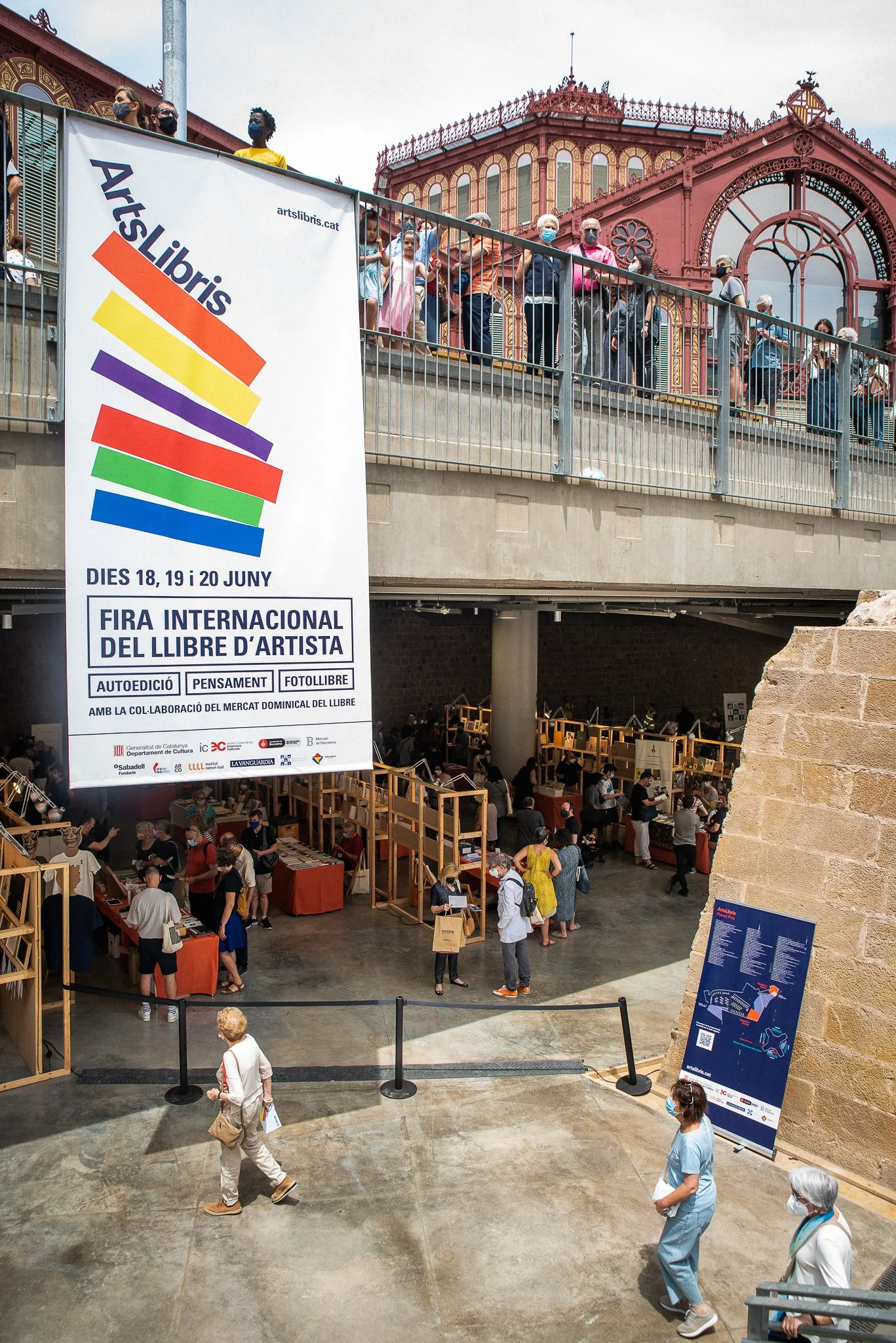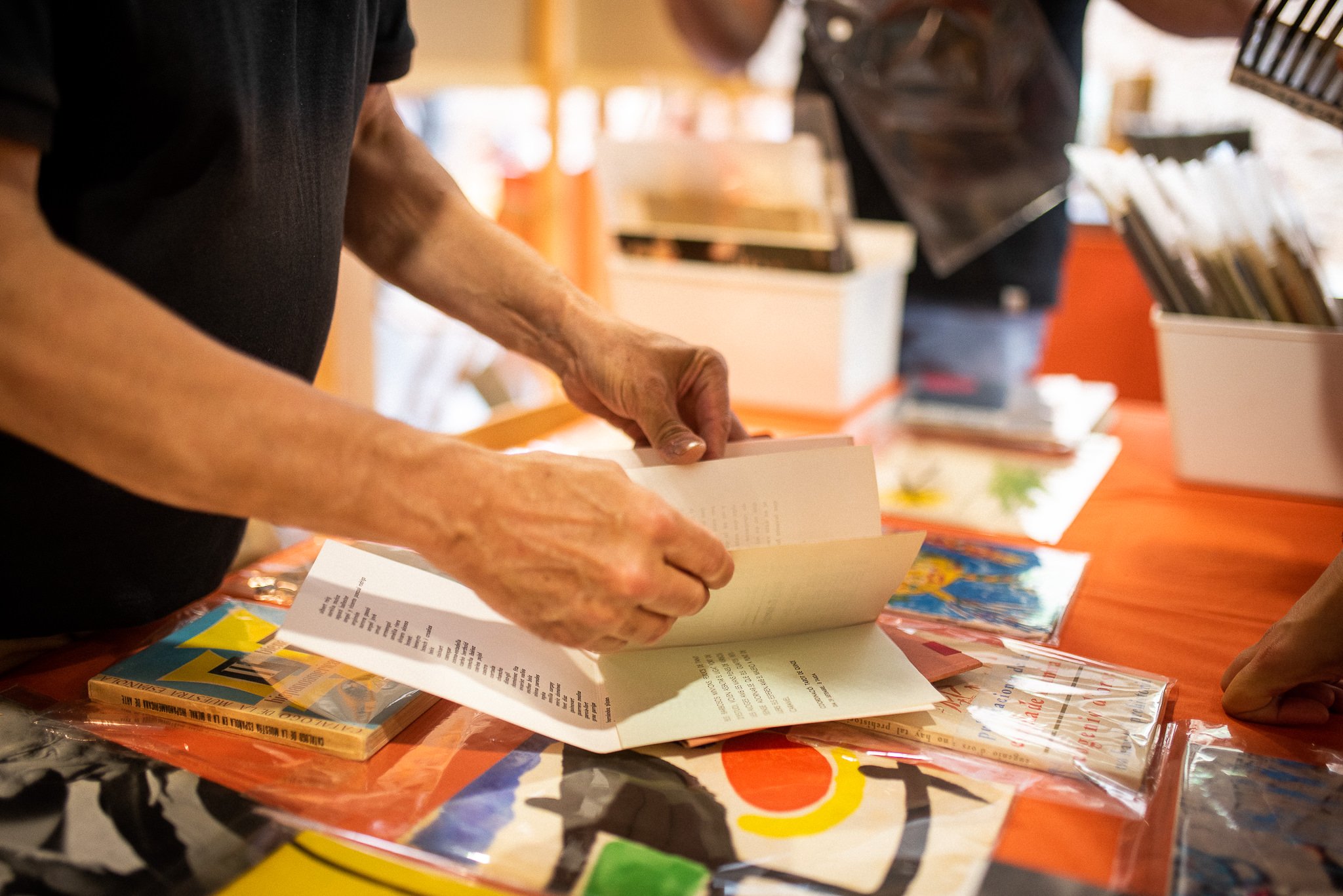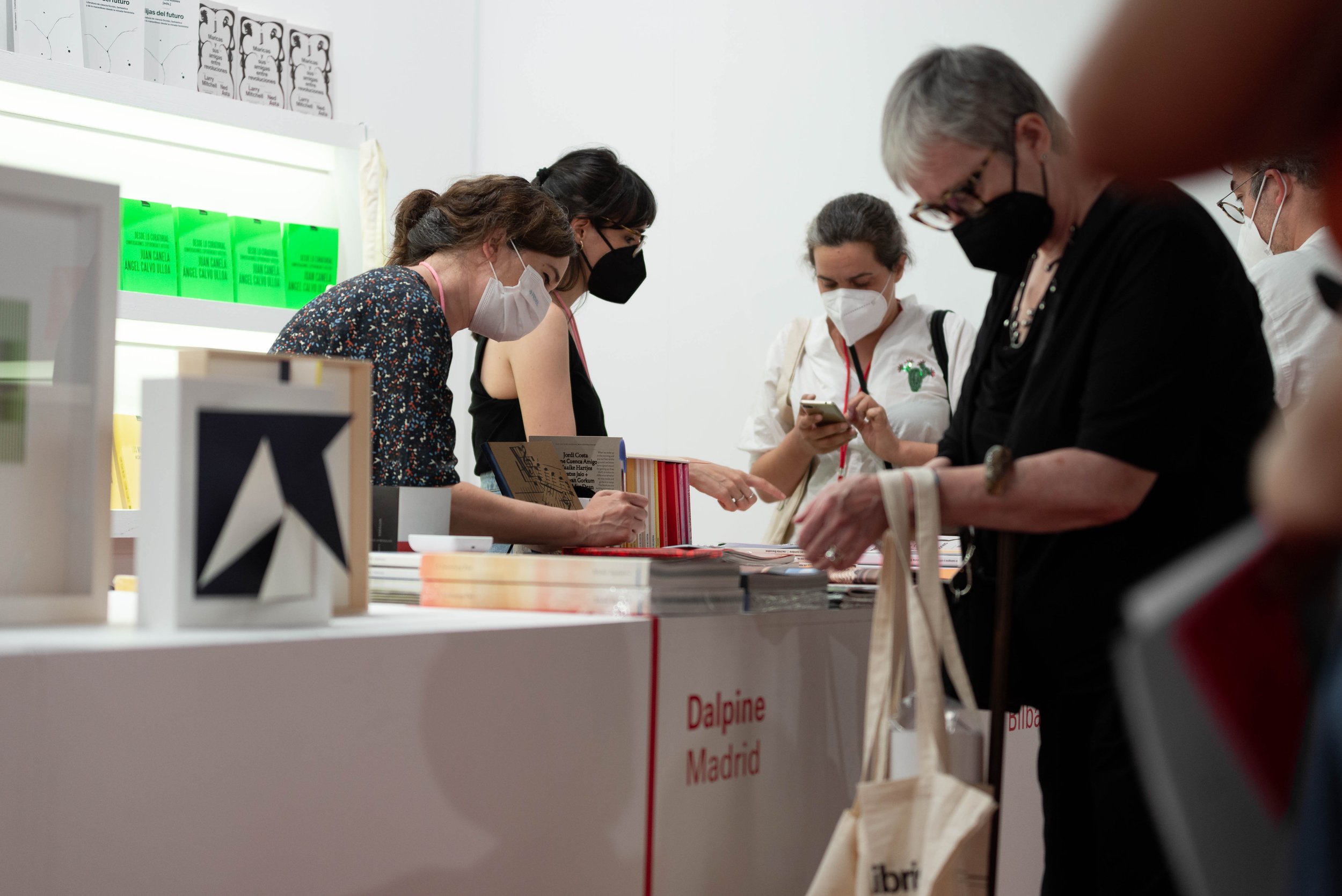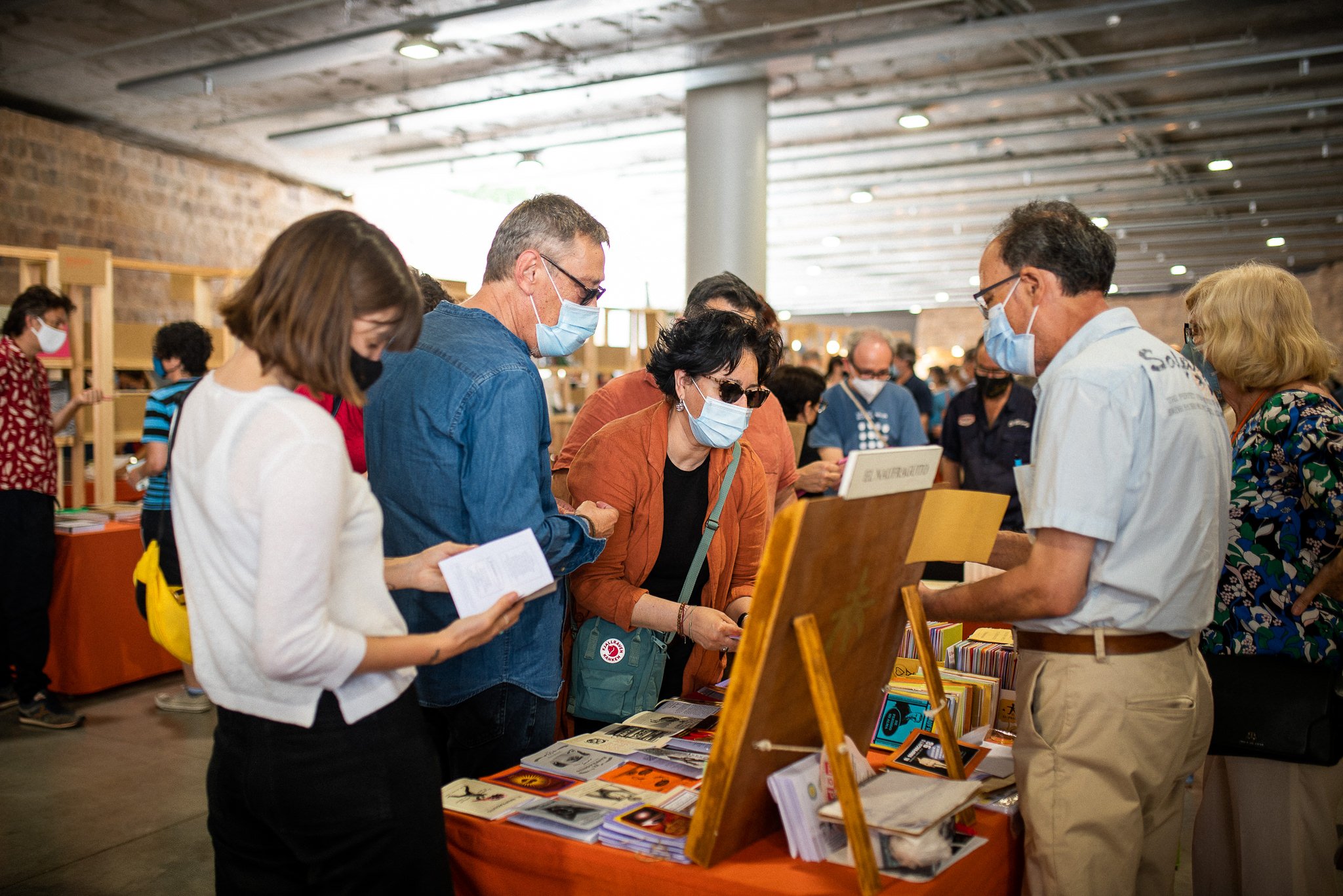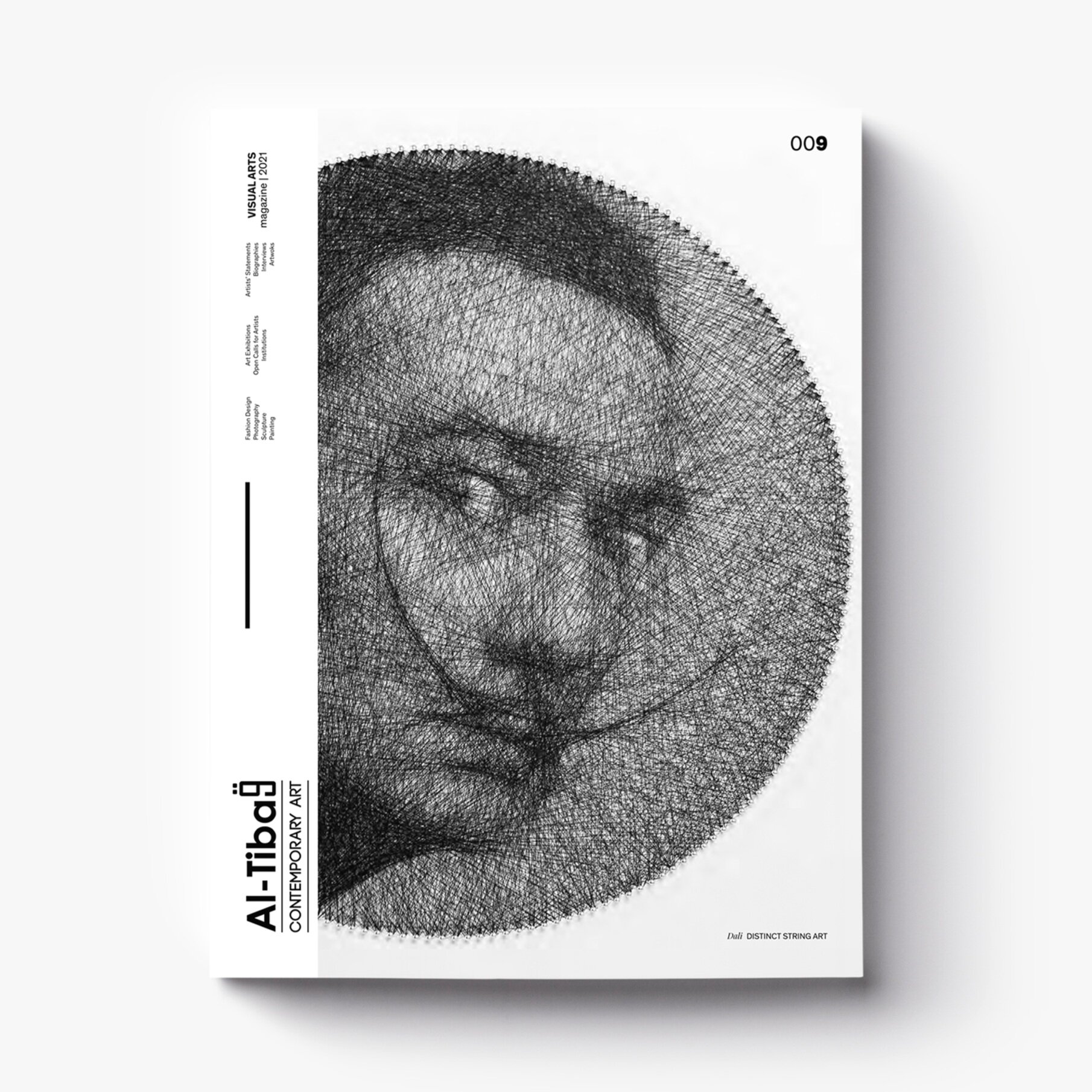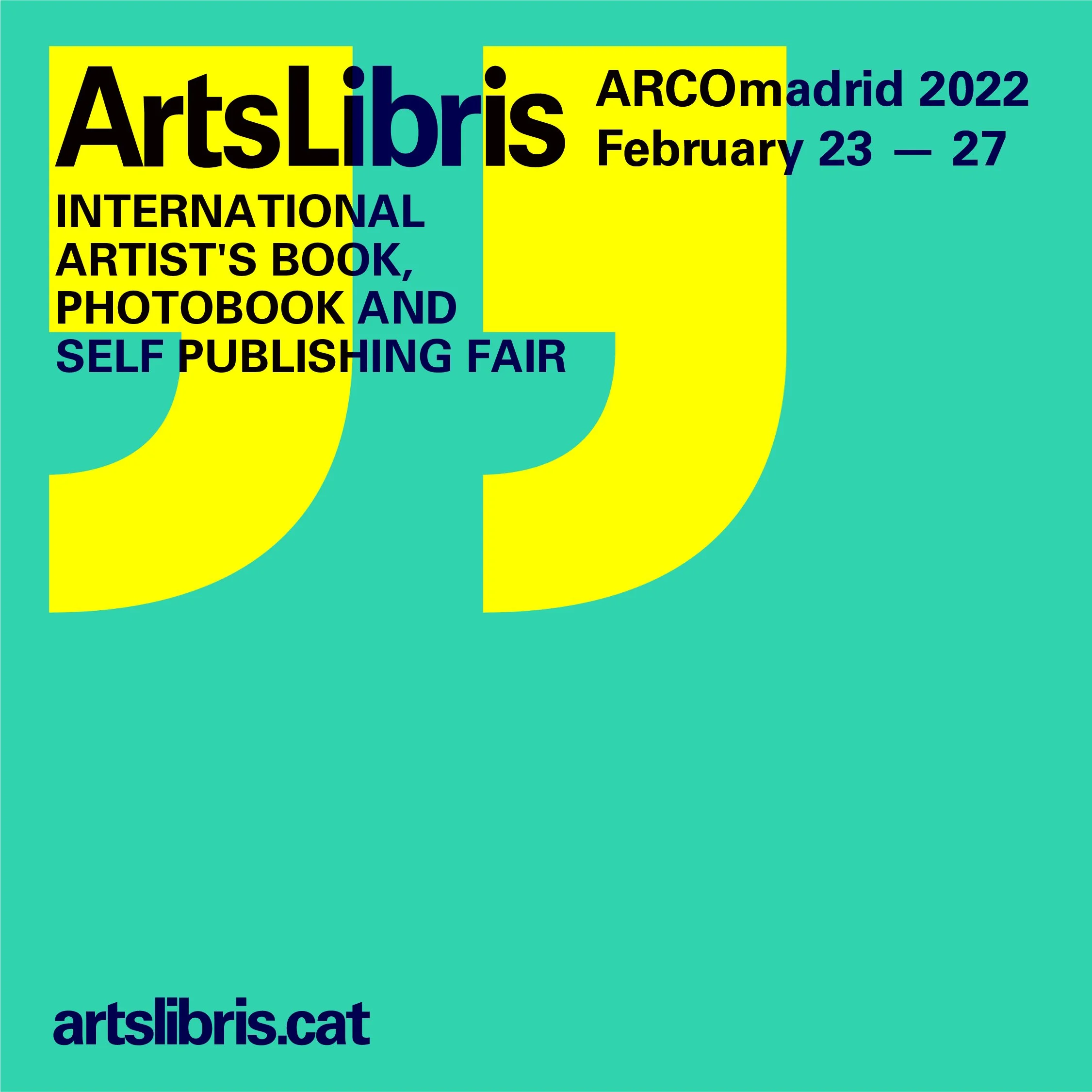ArtsLibris ARCO Art Fair 2022
Founder and director Rocío Santa Cruz highlights the ArtsLibris international Artist’s Book, PhotoBook, and Self-Publishing fair
ArtsLibris 7th edition in ARCOlisboa with 30 exhibitors and 54 in ARCOmadrid, both national and international exhibitors, and a strong presence of publishers from Spain, Portugal, Brazil, and Mexico, in addition to a wide-ranging cultural program featuring participating artists and publishers.
This year, and for the first time, the Speakers’ Corner, a space for presentations and discussion, will also integrate the programs of the galleries participating in ARCOmadrid. ArtsLibris has established itself as a space for reflection and dialogue on how publications contribute to artistic production and together with ARCOmadrid is encouraging collecting through artist publications.
Rocío Santa Cruz - Portrait courtesy Maria Dias
Rocío SC Santa Cruz | Biography
Rocío SC Santa Cruz, founder and general director of ArtsLibris, studied at the École Estienne in Paris and is the initiator of the publishing label Raíña Lupa, created in the French capital in 1994 and moved to Barcelona in 2002. Involved in the world of galleries for several years, since 2015, she has run a gallery that bears her name in Barcelona.
The interconnection between art and literature, through projects such as the edition of illustrated books and the curating of exhibitions —such as Leer imágenes: el archivo fotográfico de Julio Cortázar and La palabra y su sombra, José Ángel Valente—, are her main interests. In her activity as a gallerist, her focal points are photography, experimental cinema, and the publication of artists’ books. She conceives the gallery as a container of ideas and a space for discussing and disseminating contemporary artistic practices.
ArtsLibris ARCOmadrid 2021 - Photo courtesy ArtsLibris
INTERVIEW
First of all, let's talk about ArtsLibris. You have a fair, a bookshop, and an online platform. How would you describe ArtsLibris, and what are your main goals?
ArtsLibris is a meeting space to dialogue around contemporary publishing and artist publications, understood broadly and not only in editorial terms. In this sense, we propose to collectively consider the form of sensitive knowledge displayed in publications and their role in contributing to artistic production.
ArtsLibris is a fair and festival in Barcelona for 13 years and has two satellites within the ARCO fairs, in ARCOmadrid, and ARCOlisboa. In addition to the fair itself, the project is enriched with activities such as international seminars, workshops, or related presentations. Its main goal is to bring forward the wide world of artist publications in multiple formats, including photobooks and self-publishing.
In 2020, coinciding with the pandemic, we built an online platform to incorporate an online bookshop. Later, when it was possible to reopen the RocíoSantaCruz Gallery, we dedicated a part of it to the library of artist publications linked to this online platform.
How did you come up with the fair idea and its concept?
In 2007, on the occasion of Catalonia's participation as a guest of honor at the Frankfurt Book Fair, Vicenç Altaió curated the exhibition "VisualKultur.cat", which showed editorial projects by artists. I participated with the editions that I had done in Paris of Catalan artists such as Lluís Guinovart, Carlos Pazos, or Francesc Torres. The following year, in 2008, this exhibition was organized again in Barcelona, and I was invited to run a seminar around publishing.
At that time, I had lived for fifteen years in Paris, where I started my career and had my first gallery and publishing house, Raíña Lupa. I also participated in artist publication fairs throughout Europe and the United States. So, I had the idea of launching a fair of this kind in Barcelona, considering Catalonia's history regarding books and the interest that Catalan artists have always had in linking with books. And that's how it came about! In 2009 we made the first ArtsLibris, and it is fair to say that it was Vicenç Altaió who helped me accomplish it.
ArtsLibris ARCOmadrid 2021 - Photo courtesy ArtsLibris
Among the exhibitors of the fair, you have important institutions and museums, such as MACBA, Fabra i Coats: Centre d'Art Contemporani, or TBA21 Thyssen-Bornemisza Art Contemporary, as well as independent and self-publishing editors. What is your selection process, and how do you choose the right institutions and editors to present inside the fair?
We are mainly interested in having a wide range of publishers. We try to include in ArtsLibris all kinds of projects. Museums and art centers are doing relevant work with publications, but we are also very interested in independent projects and self-published artists. The phenomenon of self-publishing right now is gaining a lot of prominences, especially thanks to the digital tools that technology brings to artists.
Artists always have self-published. In the 1960s, they began to bypass the figure of the editor that usually forced them to function within certain margins. We believe that this figure of the publisher is important. Still, it is also essential to give rise to these processes that are closer to the artist's book itself in this freer and more rebellious aspect works that question the mechanisms of the art market and therefore are also very enriching.
With digitization, creators have appropriated technology, which instead of being a danger to artists' books, has opened up new possibilities and has motivated a greater quantity and quality of projects. Nowadays, disseminating these projects is also possible; you can work on demand and not depend on the publisher or the obligation to make long runs for the publication to be profitable. This fact favored the great photobook boom and currently covers other types of self-publishing.
So, with the ArtsLibris calls, we select projects from quality and contemporaneity and always looking for variety. That's why we choose projects from these large institutions that you mentioned or from influential publishers, but we also included other independent or very small and self-managed ones, which are also of excellent quality and interest.
What advice do you have for editors, especially independent and self-publishing ones? Any recommendations to be successful?
To me, the key is perseverance. In the art world, it is crucial to think in the medium and long term, be consistent, and never stop learning, working, or proposing new projects. I do not believe in success, but in constructing a path, that will have its ups and downs, to try to make a living with what you enjoy doing and achieve the goals that each one sets in their projects.
One of the things I am most proud of with ArtsLibris is that we are helping to professionalize the sector. Little by little, we have seen how projects with a very alternative and self-publishing origin now are working as professional publishers.
ArtsLibris Barcelona 2021 - Photo courtesy ArtsLibris
ArtsLibris is a fair within a fair, ARCOmadrid. How important do you think this partnership is to connect galleries and editors?
More and more galleries and institutions are interested in artist publications instead of catalog publications since the artist's book can be one more piece in the exhibition. This year at ARCO, we organize the Speakers' Corner talk space together because galleries increasingly demand to present editorial projects within ArtsLibris. This is why we have come together, and presentations this year come from our editors as well as galleries that present editorial projects with their artists.
It is fantastic for our project to be part of ARCO since it brings us closer to the public interested in the books in ArtsLibris. The one hundred thousand people who attend ARCO each year are the audience that is interested in our publications. On the other hand, we contribute to the fair because we are able to generate a first experience in collecting for other profiles that may be interested in contemporary art collecting in the future. Thus, we range from an expert collector looking for a rare specimen that they will find in the ArtsLibris section to a young person who buys a work of art for the first time in a book format.
ARCOmadrid 2021
You also run a contemporary art gallery yourself. As both a gallerist and publisher, what are the mutual benefits that an event like this can grant to galleries, museums, editors, but also galleries with art collectors?
As I mentioned in the previous question, this collaboration is essential because galleries are increasingly interested in publishing artist books. For that, they also need to connect with publishers to co-edit.
The publisher provides other distribution channels for artistic projects through its catalogs, digital platforms, and fairs in which it participates. Sometimes the channel is not the same, the gallery goes to art fairs, but if those books are co-published with a publisher, they will also have another journey through the publishing fairs and their digital media. This is why the partnership between gallery owners and publishers is so important.
How do you differentiate your work for each edition with three fairs each year, in ARCOmadrid, ARCOlisboa, and ArtsLibris Barcelona? What is the role of the public in all this?
The work at each fair is different. One reason is its size: Madrid sees the participation of about fifty publishers, Lisbon about thirty, while in Barcelona we reach a hundred publishers. This is already a conditioning factor. On the other hand, the public is also different. We have a more specific public at ARCO, very interested in contemporary art. In contrast, in Barcelona, our public is the citizenry, a much broader and more varied public, especially since we are in the Mercat de Sant Antoni, so we reach a much more popular audience. In Lisbon, although we go hand in hand with ARCO as well and connect with the public of contemporary art, we also connect with the publishing tradition that Portugal has in a less numerous but highly specialized fair.
Speakers’ Corner at ArtsLibris ARCOmadrid 2021 - Photo courtesy ArtsLibris
Another difference is the approach of the fair in each location. In Madrid, we have a higher presence of Latin American publishers and projects, while in Lisbon, there is a bigger presence of Portugal, Brazil, and Africa. Finally, ArtsLibris Barcelona is deeply rooted in Catalonia and the local public. For example, we involve the city's art schools and other public and private institutions or independent projects that we support and invite to participate.
Speakers’ Corner at ArtsLibris Barcelona 2021 - Photo courtesy ArtsLibris
ArtsLibris Barcelona 2021 - Photo courtesy ArtsLibris
Covid had a significant impact on fairs worldwide, but you managed to organize two successful fairs in 2021 despite the pandemic still impacting our lives. How did you do that?
In April 2020, two days before the fair opened in Barcelona, it was canceled. Faced with this adversity, we decided to set up an online platform that would allow the dissemination of the publishers who were going to participate. From there, the online bookstore was born, which worked well, and in September 2020, we decided to dedicate a part of the gallery to the ArtsLibris bookshop—following in the footsteps of my first gallery in Paris, Raíña Lupa, which already included a bookshop.
In 2021 ArtsLibris Barcelona 2021 changed its location and calendar to guarantee sanitary measures. We looked for an outdoor space and moved the fair to summer. The Mercat de Sant Antoni location was ideal as it is a place closely linked to books, as the Mercat Dominical del Llibre is held there every week.
ArtsLibris Barcelona 2021 - Photo courtesy ArtsLibris
It was a risk since we were changing venues after eleven years and leaving a space dedicated to art, such as Arts Santa Mònica. The Mercat was an open-air and covered space, which was challenging but worked very well. The fact that a month later, we were at ARCOmadrid, which was held in July, was also complicated. As everyone in the culture sector, we had to adapt to uncertainty and make risky decisions. However, it has given us new learning opportunities, and now we have a physical and online bookshop that perhaps we would not have promoted in other circumstances.
It has been a few difficult years, but we have also managed to add wealth to the project. This ability to adapt has been the success of ArtsLibris, always attentive to the evolution of the sector itself.
What can our audience expect from your fairs in 2022?
2022 is the year of trying to return to certain normality and doing things that we have not been able to do in the last two years. Many ways of doing things are changing in our work, but I think we can come out stronger.
We are about to inaugurate the first ArtsLibris of the year, and we have more publishers than ever in Madrid so we can have very positive expectations.
The entire sector is eager to meet and return to these exchange spaces. Publishers want to show their books, and the public wants to see them. Working online is a great advantage and allows us to cross borders, but the pleasure of going to ArtsLibris, seeing and touching the books, talking to the publisher or the artist who has made that publication, is irreplaceable. The digital will never be comparable to the physical experience in front of an editorial piece. We are all looking forward to touching each other again and touching the books!
If we already have very good feelings for Madrid, surely both Lisbon and Barcelona will be outstanding projects as well. We are already preparing ArtsLibris Lisbon and Barcelona, and I think we will not disappoint.
Could you share your advice for editors and art professionals out there who are seeking to follow your path?
Likewise, perseverance, thinking in the medium and long term, being willing to work hard and fight for their goals, always working with respect for the projects that preceded their own. Also, feed curiosity and learning constantly. When you understand work not only as a means of living but as a pleasure, and you enjoy what you do, it is a great privilege.
Al-Tiba9 Booth Nº18 at ArtsLibris
ABOUT ArtsLibris >>
ArtsLibris was founded in 2009 as a publishing fair project specializing in artist’s publications, photobooks, contemporary thought, self-publishing, and digital publications. It has three annual fairs, ArtsLibris Barcelona, ArtsLibris ARCOmadrid and ArtsLibris ARCOlisboa. Over the course of eleven editions, ArtsLibris has consolidated an international reputation with a distinct identity rooted in the Mediterranean and Latin American context.

